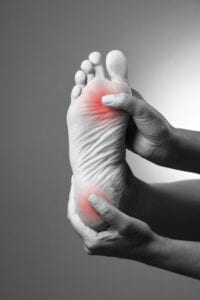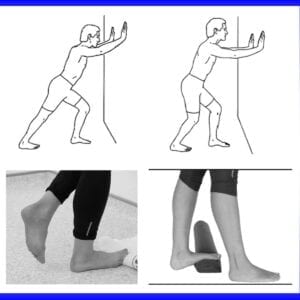What is Plantar Fasciitis
Plantar fasciitis is one of the most common causes of arch and heel pain and is caused by inflammation of the thick b
and of tissue that runs across the bottom of your foot connecting your heel bone to your big toe (plantar fascia).
Plantar fasciitis commonly causes a stabbing pain in your arch and/or heel that usually occurs with your first steps in the morning or after prolonged sitting. As you get up and move, the pain normally decreases, but it might return after long periods of standing or walking.
Plantar fasciitis tends to be more common in runners, people who are overweight, and in people who wear shoes with decreased support.
Risk Factors for Plantar Fasciitis
Plantar fasciitis often occurs due to muscle tightness in the calf (gastrocsoleus) muscles as well as repeated over stretching and tearing of the fascia due to repetitive strain. Such strains can occur from excessive running or walking, inadequate foot wear, and from a jumping injury when landing.
Even though plantar fasciitis can develop without an obvious cause, some factors that can increase your risk of developing this
condition include:

Pain in the foot caused by plantar fasciitis.
- Certain types of exercise – Exercise and activities that place a lot of stress on your heel and surrounding tissue (such as long-distance running, ballet dancing, and aerobic exercises).
- Foot mechanics – Having flat feet, high arches or an abnormal gait (walking) pattern can affect how your weight is distributed when you’re standing or walking and can put added stress on the plantar fascia.
- Obesity – Excess body weight put extra stress on your plantar fascia.
- Occupation – Jobs that require prolonged standing such a factory workers, teachers and others who spend most of their work hours walking or standing on hard surfaces can damage the plantar fascia.
- Pelvic Obliquity – Abnormal alignment of your pelvis can result in an apparent leg length discrepancy, which alters how your foot hits the ground with every step you take. Altered gait mechanics due to a pelvic obliquity can lead to chronic plantar fasciitis.
Complications
Ignoring plantar fasciitis may result in chronic heel pain that interferes with your regular activities. Pain may become more frequent, more intense, and may not go away during the day. Changing the way that you walk as a way to relieve plantar fasciitis pain might lead to knee, hip or low back pain over time.

- Stand facing a wall 2-3 feet away. Take one step toward the wall with your left foot.
- Place both palms on the wall. Bend your left knee.
- Lean forward, keeping the right leg straight and the right heel on the floor.
- Hold for 30 to 60 seconds. Repeat 5-10 times, spending 5 minutes or more stretching.
- To increase the stretch in your plantar fascia, roll a towel or face cloth and place under the ball of your big toe while performing the stretch. (As shown in picture below on left).
- Stand facing a wall 2-3 feet away. Take one step toward the wall with your left foot.
- Place both palms on the wall. Bend your left knee.
- Lean forward, slightly bend the right knee keeping the right heel on the floor.
- Hold for 30 to 60 seconds. Repeat 5-10 times, spending 5 minutes or more stretching.
- To increase the stretch in your plantar fascia, roll a towel or face cloth and place under the ball of your big toe while performing the stretch. (As shown in picture below on left).
You can also stretch your calf muscles out by standing with your forefoot on a bolster or rolled up towel as shown in picture below on the right.
Physical Therapy Intervention for Acute & Chronic Plantar Fasciitis has many benefits such as;
- Decrease pain
- Restore function
- Increase strength
- Increase flexibility
- Improve joint stability
- Prevent re-injury
- Optimize performance
Physical Therapy Rehabilitation Services
If you are searching for relief of plantar fasciitis, or other types of joint pain, then skilled Physical Therapy intervention is a highly effective non-surgical treatment option to improve or resolve your condition. Physical therapists are like body mechanics and can help to find the mechanical cause of your pain. A skilled therapist will perform a comprehensive evaluation to assess all factors contributing to your condition.
It’s time to act and reduce or eliminate your pain, call to schedule an appointment with a physical therapist today. Your therapist will develop a personalized treatment plan based on your evaluation findings to target your specific needs. Balance Solutions Physical Therapy is here to help, offering advanced physical therapy and manual therapy intervention for pain relief.
Balance Solutions Physical Therapy is located at Commerce Park in Beachwood Ohio, just on the outskirts of Cleveland. Services offered include physical therapy, massage, myofascial release, Integrative Dry Needling, as well as Pilates mat and reformer private and class lessons.

